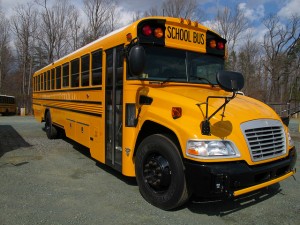
If a charter school doesn’t provide busing to its students, do they still have equal access?
That’s the question at the center of a legal dispute between a Florida school district and one of the nation’s largest charter school networks.
In October 2013 – some two months after the Renaissance Charter School at Tradition first opened its doors – the St. Lucie County School District told the school it needed to provide bus service to students living more than two miles away, legal documents show. The school, which is managed by Charter Schools USA, has challenged that requirement in two legal proceedings, pitting the high-profile charter operator against a district that allows most of its students to exercise some form of district-operated school choice.
The standoff centers on a provision in Florida charter school law that affects students statewide. Florida statutes require districts and charters to work together so that transportation does not become “a barrier to equal access for all students residing within a reasonable distance of the charter school.”
That has meant different things in different districts. The 40,000-student St. Lucie district contends charter schools should be required to provide bus service. The school at Tradition counters that the law doesn’t give the district the authority to place that requirement on charter schools, and that transportation has not been a barrier to its students. After all, the school is oversubscribed.
“Since its inception, Tradition has had more students enrolled than it projected and the charter school currently has a waiting list of students hoping to matriculate there despite the fact that it does not offer regular busing to its students absent exceptional circumstances required by law (as is the case, upon information and belief, with most charter schools in Florida),” the school’s attorney wrote in a legal brief.
The school’s transportation plan includes helping parents arrange carpools to ensure their children can get to school, a practice employed by other charter schools around the state.
John Ferguson, the school district’s attorney, however, said carpools fall short of the requirements in the district’s charter contracts.
“It’s very clear in the charter law that transportation should not be a barrier for any family to attend a charter school,” he said in an interview. Tradition’s charter states it will be open to all students in the county, he added, and “if that is going to be meaningful then transportation cannot be a barrier to any family that wishes to attend their school.”
As more students attend charter schools and other options beyond their neighborhood boundaries, many families have cited lack of transportation as a potential obstacle to true school choice.
But that doesn’t mean it’s an obstacle everywhere, and charters and districts in Florida are helping students overcome barriers in different ways. Edward Pozzuoli, the school’s attorney, said sometimes that requires busing. Other times it does not. He said the St. Lucie case is about whether districts have “the ability to regulate or do more than the statute provides.”
Charters around the state have arrived at a range of different transportation arrangements for charters, which often vary for individual schools. In Manatee County, a handful of charter schools that relied on the district for transportation saw an existential threat when the district proposed to stop provider bus service as a cost-saving measure. One network of Bay County charter schools has created its own spoke-and-hub bus system in response to district requirements.
The St. Lucie County district allows students to choose among multiple public schools. The district is essentially divided into thirds, and it provides students with bus service to any district school within their slice of the district, as well as to magnet schools and other district-wide options. Some school districts do not provide as the same level of transportation service to students who attend even district schools of choice.
“We have been dealing with unique transportation issues for the last 25 or more as we’ve had this district-wide school choice operation,” Ferguson said.
He said it could be possible for St. Lucie to include Tradition in its district-wide transportation system and bill the school. Charter schools, which receive less overall funding per student, sometimes decide busing is necessary for students to reach their schools, and worth the cost. Other times, they bristle at the expense.
“If the charter school were to be forced to provide bus transportation to all students, as the school board requires, it might well have to offer less services or classes to its students and some charter schools might even have to close,” Tradition states in one legal filing. “This is precisely why charter schools are not required to bus all students.”
The two administrative law cases have been combined. They were initially set to come before an administrative law judge later this month, but the hearing has been delayed to give the two sides more time for fact-finding. Both sides also say they would still prefer to resolve the issue amicably.
Photo via Bill McChesney on Flickr.


